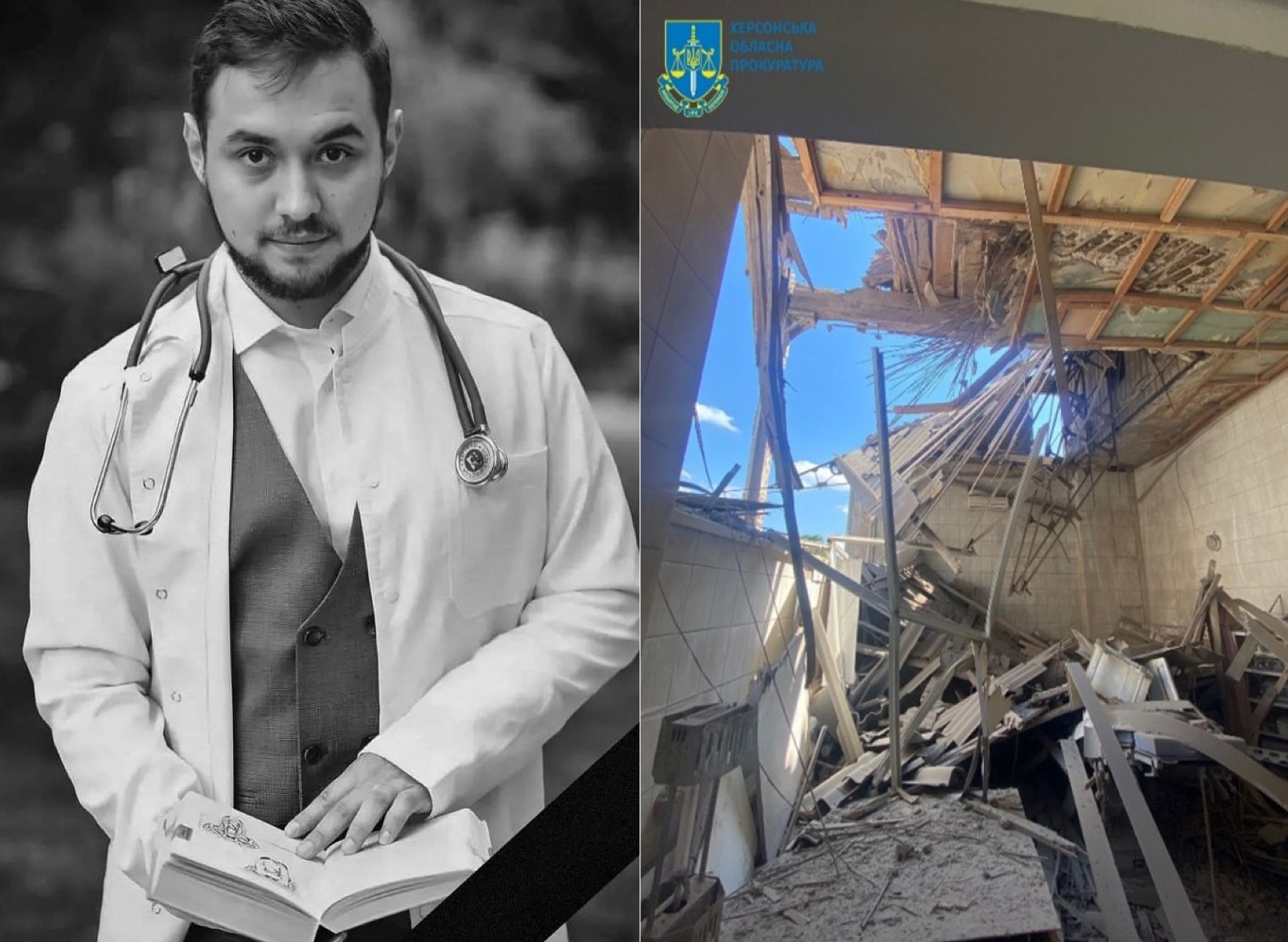
Dmytro Bily died of multiple shrapnel wounds on 1 August when the Russians bombed yet another hospital in Kherson. The young doctor was killed on his first day at the Kherson Clinical [Karabelesh] Hospital. Russia’s direct airstrike also injured a nurse and caused major damage to two floors of the hospital, with these including the operating theatre. The enemy chose 11 a.m. when the hospital was likely to be very busy and when operations would almost certainly be underway.
Kherson has come under Russian bombardment virtually every day since the city was liberated by Ukraine’s Armed Forces on 11 November 2022. Whether the attacks on the city do serve some military purpose or are simply in revenge for the obvious joy with which Ukrainians welcomed the liberating army may be in question. What is indisputable, however, is that the vast majority, if not all, of the airstrikes and shelling have been of civilian targets.
Several reports have provided considerable evidence that Russia is deliberately seeking to destroy Ukraine’s civilian infrastructure, with medical institutions having repeatedly come under fire. A major report by several international and Ukrainian human rights NGOs* on the first anniversary of Russia’s full-scale invasion documented over 700 attacks on Ukraine’s healthcare system. These included direct airstrikes on hospitals or other medical establishments; the looting of others; attacks on ambulances and the torture, abductions or killing of health workers. By the end of December 2022, the invaders had killed 62 healthcare personnel and injured 52. As of July 2023, Russia is holding around 500 medics, both military and civilians prisoner in appalling conditions. Military doctor Mariana Mamonova was only finally released in an exchange of prisoners shortly before the birth of her daughter. The Russians had not only held the pregnant woman prisoner for many months but took no steps to provide proper nourishment. It was her fellow prisoners who shared their food, etc. with her and probably ensured that her baby was born healthy.
Literally all of the above is in violation of international law, according to which all healthcare establishments and medical personnel enjoy particular protection. This is the case, regardless of whether the medical personnel are serving in the Armed Forces or civilians, with it also immaterial whom they are treating.
The ‘best’ that can be said with respect to Russia’s behaviour is that some of its attacks may have been indiscriminate. In fact, however, earlier reports, as well as that published on the anniversary, (Destruction and Devastation: One Year of Russia’s Assault on Ukraine’s Health Care System) suggest that Russia has also deliberately “targeted Ukraine’s health system as part of a broader attack on Ukraine’s civilian population and infrastructure.”
According to Christian de Vos, from Physicians for Human Rights, one of the co-authors of the report, “evidence strongly suggests these acts constitute war crimes and a course of conduct that could potentially constitute crimes against humanity as well.”
During the first ten months of full-scale war, the authors reported that an average of two attacks, including the bombing of hospitals, torture of medics and shooting at ambulances, had been carried out each day.
The 707 total attacks on health care which the researchers documented included both those where the health system was targeted and those which were indiscriminate. Such ‘unintentional’ strikes on the health care system would probably still count as war crimes as they were almost certainly on civilian areas, even if the Russians did not care whether they hit a residential building, a school or a hospital. the authors point out that they provide a minimal estimate of the conflict-related damage to Ukraine’s health care system during 2022, with the real figure likely to be higher.
The authors are also updating such information here. As of 1 August 2023, they report that there have been 996 attacks on Ukraine’s healthcare system since 24 February 2022, of which 407 attacks damaged or destroyed hospitals and clinics. 145 health workers have been killed. It is possible that this figure was given before the Russians killed Dr Dmytro Bily on 1 August.
Nearly one in ten hospitals in Ukraine was directly damaged by Russian attacks, with some oblasts obviously particularly badly affected. In Mariupol, almost eight out of ten healthcare establishments were damaged or destroyed. In 48 cases, hospitals were hit several times. Just one hospital in Sievierodonetsk (Luhansk oblast) was hit ten times between March and May 2022. Such multiple hits “underscore not only the indiscriminate nature of attacks but also the possibility that they were deliberately targeted.”
Another reason for suspecting that the hospitals were deliberately targeted is that many have internationally recognizable symbols on the buildings which were clearly visible from the air.
These reports are of vital importance as very many attacks, especially those in cities, like Sievierodonetsk, which remain under Russian occupation, do not receive sufficient publicity. Photos and video footage from the horrific attack on a maternity hospital in Mariupol on 9 March 2022 were very widely published and elicited international outrage. Russia’s ‘response’ in such cases has been contradictory and deeply incriminating. After two days of silence, Russian foreign minister Sergei Lavrov claimed that the maternity hospital was being used, not as a hospital, but as a base for the Azov Battalion. This was demonstrably untrue. After having thus effectively admitted to bombing the hospital, Russia then adopted a different approach, with propaganda channels and the FSB deployed to fake ‘evidence’ that it was Ukrainian defenders who had somehow destroyed the hospital.
Among those protected under international law, yet imprisoned by Russia, are medical personnel who were trying to rescue wounded soldiers. Andriy Kryvtsov, head of Military Medics of Ukraine, is in no doubt that, through such behaviour and through the failure by their captors to provide medication, the Russians are intensifying the suffering of those injured. The only possible excuse for Russia to be holding any medical personnel prisoner is if they are needed to treat prisoners of war. All, however, are being held in prisons, with the conditions shocking and with medics effectively prevented from properly treating them.
With respect to the 707 documented attacks on the healthcare system alone (and there have been many more since), the authors are clear that the impacts “on the health and wellbeing of Ukrainians are devastating and far-reaching, resulting in the denial of access to medical care, reduced vaccination rates, barriers to managing chronic diseases, and severe mental health tolls.”
Pavlo Kovtoniuk, co-founder of the Ukrainian Healthcare Centre and a co-author of the report pointed out that Russia deliberately merges civilian and military targets. “For them, destroying hospitals, schools, and the power grid is a way to achieve military aims. Russia used this murderous tactic before, in Chechnya and Syria, but faced no accountability. If impunity doesn’t end now, we will see many more hospitals destroyed as a means of war in the future. Unpunished evil always grows.”
The authors of the report call on all investigative bodies, national prosecutors and the International Criminal Court’s Office of the Prosecutor to prioritize investigation into such attacks on healthcare facilities and medical personnel, focusing specifically on such violations as war crimes and crimes against humanity.
* Eyewitness to Atrocities; Insecurity Insight, the Media Initiative for Human Rights Physicians for Human Rights; and the Ukrainian Healthcare Centre



